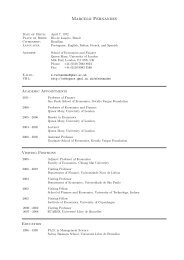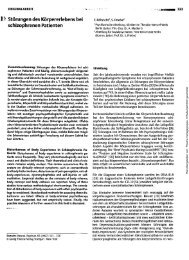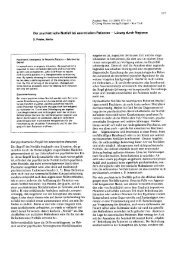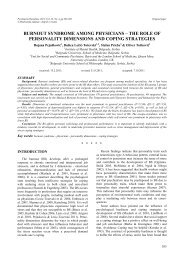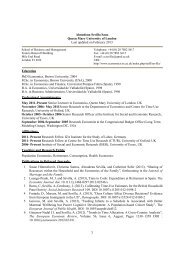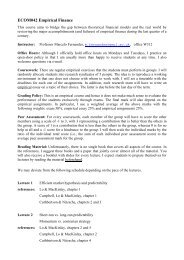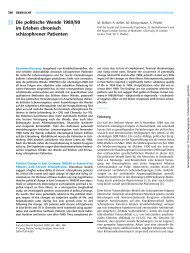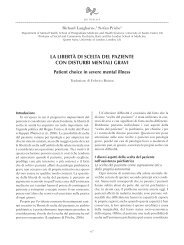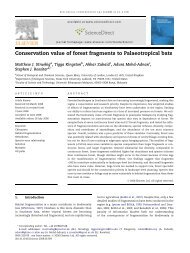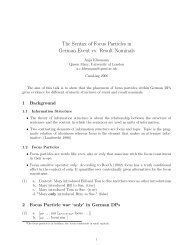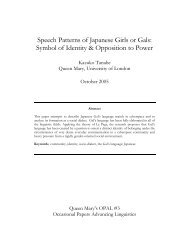Proofs - Personal Webspace for QMUL - Queen Mary, University of ...
Proofs - Personal Webspace for QMUL - Queen Mary, University of ...
Proofs - Personal Webspace for QMUL - Queen Mary, University of ...
Create successful ePaper yourself
Turn your PDF publications into a flip-book with our unique Google optimized e-Paper software.
are listed by Turkish immigrants in Berlin, <strong>for</strong> example the most<br />
frequent listing <strong>of</strong> the term “depression”, listing <strong>of</strong> “fears” and<br />
“schizophrenia” (see table 1). In contrast they do not appear<br />
among the most frequently listed terms <strong>of</strong> the Turkish group<br />
in Istanbul.<br />
Another interesting result is that both Turkish groups use<br />
specifi c Turkish terms <strong>for</strong> which there is no equivalent expression<br />
in the German or English language, as <strong>for</strong> example”rahatsızlık”<br />
which comes close to the meaning <strong>of</strong> “not feeling well” or<br />
„sıkıntı” that might be translated as “distress/annoyance”.<br />
Regarding the meaning <strong>of</strong> psychological problems (Table 2),<br />
the terms “exclusion” and “restrained life” were only mentioned<br />
by the two groups in Germany. Additionally, the native Germans<br />
named some categories that do not appear among the most mentioned<br />
terms in the other groups, as “anxiety, fears”, “problems<br />
in dealing with other people”, “problems in coping with daily<br />
life”, “family and friends suffer as well”, “somatic complaints”<br />
and “low self- esteem”. Both Turkish groups list the categories<br />
“being sad/unhappy” and “bad thing”.<br />
Also the categories concerning causes <strong>for</strong> mental disorders<br />
or psychological problems vary between the different groups.<br />
Native Germans as well as Turkish immigrants list “childhood/<br />
upbringing”, “stress” and “loss <strong>of</strong> a beloved person” <strong>of</strong>ten as<br />
cause, but the other terms named by these two groups differ<br />
from each other. The native Germans list categories like<br />
“trauma”, “genetic”, “severe experiences”, “work” and “drugs”<br />
while these categories do not seem to be equally important <strong>for</strong><br />
Turkish immigrants. The latter list “family problems” relatively<br />
<strong>of</strong>ten as well as “pressure”, which were listed by Turks in Istanbul<br />
as well. Turks in Istanbul list also “genetic” causes relatively<br />
<strong>of</strong>ten, in which they resemble the German group.<br />
With regard to possible advice or help (Table 4) differences<br />
between the groups are not as strong as <strong>for</strong> the other questions.<br />
The categories resemble each other in the three included groups.<br />
Only two German answers are not found in the other groups:<br />
“psychotherapy/ psychotherapist” and “counselling <strong>of</strong>fi ces”. The<br />
answers <strong>of</strong> both groups in Germany resemble each other in the<br />
terms “doctor”, “psychologist”, “talk”, “friends” and “to distract<br />
yourself”. Turkish people in Istanbul put an emphasis on pr<strong>of</strong>essional<br />
help like “psychiatrist” and “psychiatry”, “psychologist”<br />
and “doctor” which are terms that appear only partly in the<br />
other groups. Terms that are connected to traditional healers<br />
are missing in both Turkish groups.<br />
Although there are similarities between the groups, the results<br />
suggest that the differences are linked to cultural background.<br />
However, when evaluating the data in each group in more detail<br />
and aggregating them by educational background, the variations<br />
within a group turn out to be as big as the intra- group differences<br />
observed so far. We will exemplify this fact with the answers <strong>of</strong><br />
the two groups in Germany to question 3 (causes <strong>of</strong> psychological<br />
problems/mental disorders) (Table 5 and 6).<br />
In the German group the categories “trauma”, “genetic” und<br />
“severe experiences” are named by university graduates as well<br />
as non- graduates, but the university graduates most frequently<br />
mention “work”, “experience <strong>of</strong> violence” and “drugs” while the<br />
non- graduates list “diffi cult childhood/problems in upbringing”,<br />
“loss <strong>of</strong> a beloved person” and “stress”.<br />
In the group <strong>of</strong> Turkish immigrants, the categories differed<br />
substantially according to university degree. Only the terms<br />
A. Vardar et al. / European Psychiatry 27 (2012) / supplement n°2 / S50-S55 S53<br />
Table 5<br />
Most mentioned categories regarding causes <strong>of</strong> psychological problems/<br />
mental disorders in the German group.<br />
German university graduates German non- graduates<br />
Trauma (35%)<br />
Genetic (35%)<br />
Work (e.g. stress, discontent,<br />
hierarchies) (29%)<br />
Severe experiences (e.g. accidents,<br />
shock situations) (27%)<br />
Experience <strong>of</strong> violence<br />
(e.g. domestic violence,<br />
war, rape) (21%)<br />
Drugs (21%)<br />
“pressure” and “anxiety, fears” is mentioned by both sub- groups.<br />
Besides that, university graduates mention “childhood/upbringing”,<br />
“problems with environment”, “genetic” and “fi nancial<br />
problems poverty” while non- graduates mentioned “family<br />
problems”, “problems with partner”, “stress” and “loss <strong>of</strong> a<br />
beloved person” most <strong>of</strong>ten. Especially the categories “family<br />
problems” and “problems with partner” are thus put into perspective<br />
as it becomes obvious that these terms are more relevant<br />
<strong>for</strong> the sub- group <strong>of</strong> non- graduates with Turkish immigration<br />
background and not <strong>for</strong> the Turkish group in Germany as a whole.<br />
In summary, the data show that some <strong>of</strong> the listed terms are<br />
specifi c to cultural background or immigration status. At the<br />
same time there are similar differences in terms according to<br />
subgroups, shown by the example <strong>of</strong> persons with and without<br />
a university degree. In general the inventory <strong>of</strong> knowledge<br />
about mental health issues appears to be very broad in all the<br />
groups and it is barely possible to identify a “cultural” consensus<br />
concerning certain categories as even the most mentioned terms<br />
were named by not more than half <strong>of</strong> the interviewees.<br />
<strong>Pro<strong>of</strong>s</strong><br />
4. Discussion<br />
Diffi cult childhood,<br />
problems in upbringing (41%)<br />
Loss <strong>of</strong> a beloved person (27%)<br />
Genetic (24%)<br />
Severe experiences (e.g. accidents,<br />
shock situations) (21%)<br />
Trauma (21%)<br />
Stress (21%)<br />
Table 6<br />
Most mentioned categories regarding causes <strong>of</strong> psychological problems/<br />
mental disorders in the Turkish immigrant group.<br />
<strong>University</strong> graduates with Turkish<br />
immigration background<br />
Pressure (43%)<br />
Childhood/upbringing (29%)<br />
Problems with environment (25%)<br />
Genetic (24%)<br />
Anxiety, fears (19%)<br />
Financial problems poverty (19%)<br />
Non- graduates with Turkish<br />
immigration background<br />
Family problems (49%)<br />
Problems with partner (22%)<br />
Stress (18%)<br />
Loss <strong>of</strong> a beloved person (16%)<br />
Anxiety, fears (13%)<br />
Pressure (13%)<br />
The main fi ndings are that the answers in each group are very<br />
heterogeneous and thus it is diffi cult to name specifi c vocabulary<br />
that is unique <strong>for</strong> one group. The analysis <strong>of</strong> listed categories thus<br />
shows diverse results as the differences between the groups are<br />
as big as the differences within one group.<br />
Concerning the answers <strong>of</strong> the group <strong>of</strong> Turkish immigrants<br />
with lower education degrees, the question is raised if <strong>for</strong> this group<br />
psychic stress results from family problems and is expressed in<br />
social terms. However, counselling institutions (social institutions<br />
where social workers work) were not named spontaneously as a<br />
help possibility although these answer the needs <strong>of</strong> people with<br />
family problems in the German psycho- social health care system.<br />
Concerning resources in handling mental health problems<br />
it can be stated that all three groups name pr<strong>of</strong>essional help,



